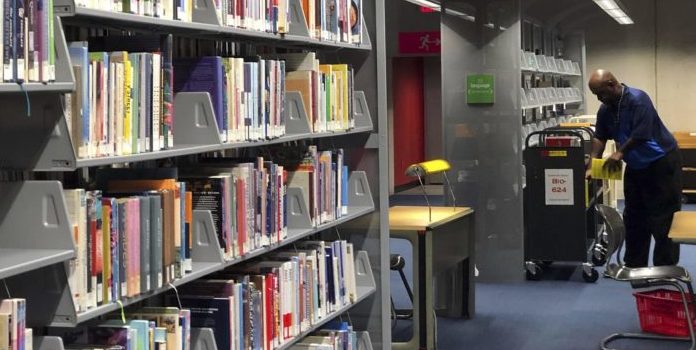(Headline USA) Two separate bills that would prohibit public libraries from displaying “explicit sexual material” passed the Senate and House floors in North Dakota on Thursday after undergoing debate among lawmakers in each chamber.
Supporters said the bills would reduce children’s exposure to pornography, while opponents said it would limit children’s access to scientific and educational content on the human body.
The Senate bill would charge a person with a class B misdemeanor—punishable by up to 30 days of imprisonment and a fine of $1,500—for willfully displaying “objectionable materials” in places that minors visit.
Objectionable materials would include content that shows or describes sexual activity, human genitals after puberty, sadomasochistic abuse and more.
The bill would apply to schools and libraries but not to colleges, universities, museums or art galleries.
“This is not a burning-the-book bill, nor is it censorship. Why? Because we are dealing with minors,” Republican Sen. Janne Myrdal of Edinburg said in support of the bill. “Pornography presented to children is not free speech. … This material is truly harmful to children.”
Republican Sen. Kristin Roers of Fargo countered that the bill would prohibit what she read and saw in her anatomy book as a child. “I went to Catholic school, so we didn’t really have sex ed. The only way you learned anything was in anatomy class,” Roers said.
After more than 30 minutes on the Senate floor, the bill passed with a 38-9 vote. It must still pass through the House and get signed by North Dakota’s Republican Gov. Doug Burgum to become law.
The House bill, which has many similarities to the Senate bill, would also prohibit public libraries from carrying sexually explicit materials. But it would not charge people with misdemeanors, and it would require libraries to develop a policy and process for keeping prohibited materials out.
When the House bill was first introduced in January, it sought to also prohibit content on sexual identity and gender identity. But after going through amendments and committee hearings with testimony from LGBT advocates who opposed the bill, that specific language on sexual and gender identity was removed.
The House bill passed with a 65-28 vote. It must also survive the legislative process in the Senate and gain a signature from the governor to become law.
As leftist double down on promoting objectionable content amid a wave of attacks on traditional values that includes not only school indoctrination but also a rise in transgender surgeries and other activism, fed-up parents have led the way in demanding accountability.
A wave of attempted restrictions on books continues to intensify across the country, the American Library Association reported in September. Numbers for 2022 approached the previous year’s totals, which were the highest in decades.
Bills to restrict mature content in school libraries became laws last year in Tennessee, Utah, Missouri, Florida and Oklahoma.
Adapted from reporting by the Associated Press

